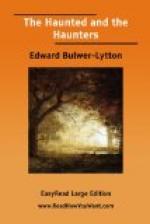“Not an imposture in the ordinary sense of the word. If suddenly I were to sink into a deep sleep, from which you could not awake me, but in that sleep could answer questions with an accuracy which I could not pretend to when awake—tell you what money you had in your pocket—nay, describe your very thoughts—it is not necessarily an imposture, any more than it is necessarily supernatural. I should be, unconsciously to myself, under a mesmeric influence, conveyed to me from a distance by a human being who had acquired power over me by previous rapport.”
“Granting mesmerism, so far carried, to be a fact, you are right. And you would infer from this that a mesmeriser might produce the extraordinary effects you and others have witnessed over inanimate objects—fill the air with sights and sounds?”
“Or impress our senses with the belief in them—we never having been en rapport with the person acting on us? No. What is commonly called mesmerism could not do this; but there may be a power akin to mesmerism, and superior to it—the power that in the old days was called Magic. That such a power may extend to all inanimate objects of matter, I do not say; but if so, it would not be against nature, only a rare power in nature which might be given to constitutions with certain peculiarities, and cultivated by practice to an extraordinary degree. That such a power might extend over the dead—that is, over certain thoughts and memories that the dead may still retain—and compel, not that which ought properly to be called the soul, and which is far beyond human reach, but rather a phantom of what has been most earth-stained on earth, to make itself apparent to our senses—is a very ancient though obsolete theory, upon which I will hazard no opinion. But I do not conceive the power would be supernatural.
“Let me illustrate what I mean from an experiment which Paracelsus describes as not difficult, and which the author of the Curiosities of Literature cites as credible: A flower perishes; you burn it. Whatever were the elements of that flower while it lived are gone, dispersed, you know not whither; you can never discover nor re-collect them. But you can, by chemistry, out of the burnt dust of that flower, raise a spectrum of the flower, just as it seemed in life. It may be the same with the human being. The soul has so much escaped you as the essence or elements of the flower. Still you may make a spectrum of it. And this phantom, though in the popular superstition it is held to be the soul of the departed, must not be confounded with the true soul; it is but the eidolon of the dead form.




